|
|
|
Sort Order |
|
|
|
Items / Page
|
|
|
|
|
|
|
| Srl | Item |
| 1 |
ID:
196577


|
|
|
|
|
| Publication |
Switzerland, Springer, 2021.
|
| Description |
xxi, 305p.: figures, tableshbk
|
| Series |
Advances in African Economics, Social and Political Development
|
| Standard Number |
9783030773359
|
|
|
|
|
|
|
|
|
|
|
|
Copies: C:1/I:0,R:0,Q:0
Circulation
| Accession# | Call# | Current Location | Status | Policy | Location |
| 060741 | 327.6/VAS 060741 | Main | On Shelf | General | |
|
|
|
|
| 2 |
ID:
111758
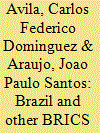

|
|
|
| 3 |
ID:
132471
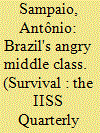

|
|
|
|
|
| Publication |
2014.
|
| Summary/Abstract |
The recent protests show that secure democracy and an absence of extremism are no guarantee of domestic stability.
On 26 May 2014, just a few weeks ahead of the World Cup, an angry crowd surrounded the Brazilian football team in Rio de Janeiro. Striking teachers attacked the team bus as it left the city's international airport, protesting the government's vast expenditure on preparations for the event and neglect of the education system. Heavily armed military police were called in to clear a path for the vehicle, and have followed the players ever since. For many Brazilians, passion for football was supplanted by demands for better infrastructure, salaries and quality of life: the 12 June Brazil-Croatia game that opened the tournament followed a year in which one person was killed and hundreds were estimated to have been injured in demonstrations around the country. This article went to press before the four-week-long competition had finished; football mania was at the time returning to Brazil. The country's mood was likely to be affected by the final result.
|
|
|
|
|
|
|
|
|
|
|
|
|
|
|
|
| 4 |
ID:
131416
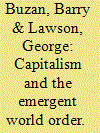

|
|
|
|
|
| Publication |
2014.
|
| Summary/Abstract |
The two-centuries-old hegemony of the West is coming to an end. The 'revolutions of modernity' that fuelled the rise of the West are now accessible to all states. As a consequence, the power gap that developed during the nineteenth century and which served as the foundation for a core-periphery international order is closing. The result is a shift from a world of 'centred globalism' to one of 'decentred globalism'. At the same time, as power is becoming more diffuse, the degree of ideological difference among the leading powers is shrinking. Indeed, because all Great Powers in the contemporary world are in some form capitalist, the ideological bandwidth of the emerging international order is narrower than it has been for a century. The question is whether this relative ideological homogeneity will generate geo-economic or geopolitical competition among the four main modes of capitalist governance: liberal democratic, social democratic, competitive authoritarian and state bureaucratic. This article assesses the strengths and weaknesses of these four modes of capitalist governance, and probes the main contours of inter-capitalist competition. Will the political differences between democratic and authoritarian capitalists override their shared interests or be mediated by them? Will there be conflicting capitalisms as there were in the early part of the twentieth century? Or will the contemporary world see the development of some kind of concert of capitalist powers? A world of politically differentiated capitalisms is likely to be with us for some time. As such, a central task facing policy-makers is to ensure that geo-economic competition takes place without generating geopolitical conflict.
|
|
|
|
|
|
|
|
|
|
|
|
|
|
|
|
| 5 |
ID:
132032
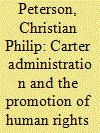

|
|
|
|
|
| Publication |
2014.
|
| Summary/Abstract |
This article will examine the effectiveness of the Carter administration's efforts to promote human rights in the Soviet Union. It will pay particular attention to how human rights promotion fit into a larger approach to transforming Superpower relations in ways favorable to U.S. interests called "reciprocal accommodation [détente]." The use of this framework provides an excellent way to tease out the complexities of how the administration balanced the promotion of human rights in the USSR with other important objectives such as concluding the SALT II treaty. It also helps reveal how executive branch worked to reduce Soviet human rights violations by citing the provisions of the Final Act and working with private citizens to raise international awareness about human rights issues. Without losing sight of his administration's inability to protect Soviet dissenters from arrest and harassment, this article will demonstrate that Carter had every intention of making the issue of human rights an important element of Cold War competition and implementing a new approach to détente that at least in part aimed at transforming Soviet internal behavior.
|
|
|
|
|
|
|
|
|
|
|
|
|
|
|
|
| 6 |
ID:
103028
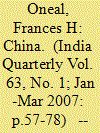

|
|
|
| 7 |
ID:
146486
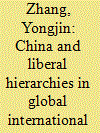

|
|
|
|
|
| Contents |
This article investigates the entanglement of the rising Chinese power with the liberal global order in negotiating for normative change. Drawing upon the English School theoretical perspective, it argues that three hierarchical constructs of liberal persuasion co-exist in and cohabit the global international society today. They are, namely, the legalized hegemony as seen in the UN Charter-based liberal pluralism; the changing normative order of emerging solidarist and anti-pluralist formation that purposively creates unequal sovereigns; and the liberal global governance order that moves predominantly in the direction of state-centric solidarism. As an emerging power with an authoritarian regime, China's entanglement with these liberal hierarchical constructs is multifaceted with complex dynamics. The article argues specifically that three differentiated strategic approaches have been developed by China in this entanglement: to defend liberal pluralism in the legalized hegemony; to contest liberal cosmopolitan anti-pluralism in the changing normative order; and to endorse state-centric solidarism with regard to the construction of a liberal global governance order. If they reflect a rising China's preferences of order construction, they also constitute an important part of China's engaging negotiations for normative change in international society. The agency China exercises in this regard helps explain the limited consensus among Great Powers as to the ‘central direction’ for the evolving global order. The preferences of China as the second among equals in the Great Power club matter greatly in understanding the contention between pluralism and solidarism in the changing raison de système of contemporary global international society.
|
|
|
|
|
|
|
|
|
|
|
|
|
|
|
|
| 8 |
ID:
130707
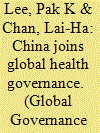

|
|
|
|
|
| Publication |
2014.
|
| Summary/Abstract |
In the wake of China's rapid ascendancy, are there any new rules made by the country in global health governance? This article examines China's emerging role in the Agreement on Trade Related Aspects of Intellectual Property Rights and finds that China adopts a pro-status quo stance on patented medicines. Aspiring to develop its own pharmaceutical sector to be capable to produce patented medicines on a par with the West, it has little appetite for using the prevailing rules or making new rules that are to the liking of the developing world. Undoubtedly, China is a new player in global health governance but has yet to have agenda-setting intent and capacity. This article argues that China's behavior and preferences can be explained by its dualistic national identities, the dominant position of realism in both the study of international relations and policy circles, and an underdevelopment of epistemic community in global health governance in the country.
|
|
|
|
|
|
|
|
|
|
|
|
|
|
|
|
| 9 |
ID:
129885
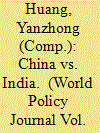

|
|
|
| 10 |
ID:
130415
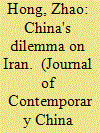

|
|
|
|
|
| Publication |
2014.
|
| Summary/Abstract |
As international pressure on China's policy concerning its increasing investments in Iran grows, the Chinese leadership has to painfully balance its impulse toward energy and economic cooperation with Iran against other important interests, including enhancing its image as a responsible big country. After analyzing the evolution of China-Iran energy relations, this paper tries to answer the question of how China has responded to the intensification of US-led sanctions against Iran, what merits and shortcomings China's attempts to balance or reconcile its interests in Iran might create, and what options China can take to deal with a possible oil crisis.
|
|
|
|
|
|
|
|
|
|
|
|
|
|
|
|
| 11 |
ID:
133853
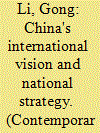

|
|
|
|
|
| Publication |
2014.
|
| Summary/Abstract |
The global order was set in place following the end of the Second World War by a consortium of western countries headed by the U. S. since then, major western countries have strived to maintain their long dominance in global politics and economics. With the rise of nationalist movements, former colonies gained their independence, and many developing countries joined the UN in recent years the economies of the emerging powers have grow rapidly and they have also joined WTO.
|
|
|
|
|
|
|
|
|
|
|
|
|
|
|
|
| 12 |
ID:
127478
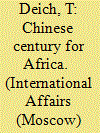

|
|
|
|
|
| Publication |
2013.
|
| Summary/Abstract |
IN RECENT YEARS, there has been a surge of international interest in Africa, not long ago known as the "forgotten continent." The world's leading countries have come to see this continent (a source of minerals and energy resources they so badly need) from a new perspective. An important factor fueling interest in Africa is the unprecedented expansion of "emerging powers" in African countries. This applies primarily to China, whose rapid economic growth induces it to double its efforts in world markets, pushing "old players" out of these markets.
|
|
|
|
|
|
|
|
|
|
|
|
|
|
|
|
| 13 |
ID:
132586
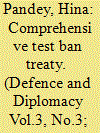

|
|
|
|
|
| Publication |
2014.
|
| Summary/Abstract |
Mushroom Clouds
Nuclear Age
Emerging Power
Atomic Bomb
Lethal Capabilities
Atomic Explosion
Nuclear Realm
Catastrophic Eventualities
Nuclear Hazards
Security Balance
Comprehensive Test Ban Treaty - CTBT
Nuclear Regime
American Perspective
Strategic Policy
|
|
|
|
|
|
|
|
|
|
|
|
|
|
|
|
| 14 |
ID:
132710
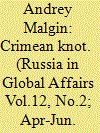

|
|
|
|
|
| Publication |
2014.
|
| Summary/Abstract |
Russia will have to deal with the effects of Crimea being part of an independent Ukraine for 23 years. A Crimean political and business elite has emerged with its own values, bonds, and relationships. Russia is not the motherland of an entire generation of Russian-speaking youth, but the motherland of their ancestors.
|
|
|
|
|
|
|
|
|
|
|
|
|
|
|
|
| 15 |
ID:
123759
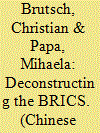

|
|
|
|
|
| Publication |
2013.
|
| Summary/Abstract |
Can the BRICS (Brazil, Russia, India, China, and South Africa) build on their momentum to transform the international order, or will they be remembered as a geopolitical fad? To assess the prospects of the figurehead for emerging power aspirations, this article examines the associational dynamics and practices that inform their collective journey. Drawing on the rationalist literature on bargaining coalitions and on the constructivist literature on 'imagined' communities, we develop an analytical framework to investigate whether states exploit their BRICS affiliation tactically, to rise in tandem, or strategically, to rise together. Two case studies, which examine BRICS efforts to curb Washington's 'exorbitant privilege' and to develop a collective response to the climate crisis suggest that even when the BRICS share soft revisionist goals, coalitional cohesion and community formation are tentative at best. In the absence of clear common objectives, the BRICS abandon all but the rhetoric of coalitional behaviour. We conclude that unless the five emerging powers agree on a coherent strategy to harness their relative strengths, the BRICS' geopolitical play will be defeated by their own tactical ploys.
|
|
|
|
|
|
|
|
|
|
|
|
|
|
|
|
| 16 |
ID:
132022
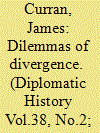

|
|
|
|
|
| Publication |
2014.
|
| Summary/Abstract |
In the period from December 1972 until November 1975 the US-Australia alliance faced its greatest ever crisis. In the hands of President Richard Nixon and Australian Prime Minister Gough Whitlam, a relationship that had endured the heights of the Cold War veered dangerously off course and seemed headed for destruction. For Whitlam the world emerging from the ashes of Vietnam offered an exciting opportunity to recast Australia's image in the eyes of the world and redefine the alliance. For Nixon, the ongoing difficulties in securing an end to the war and the mounting pressures of the Watergate scandal produced a visceral reaction to any criticism-but especially that from once close and trusted allies. In his rage he threatened to rip apart the very fabric of the alliance, asking that options be explored for pulling out top secret U.S. intelligence installations in Australia and ending all intelligence sharing. In Australia, although some saw Whitlam as the great modernizer of Australian foreign relations, others feared he was recklessly endangering the protective umbrella provided by the United States.
|
|
|
|
|
|
|
|
|
|
|
|
|
|
|
|
| 17 |
ID:
134042
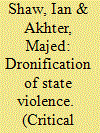

|
|
|
|
|
| Publication |
2014.
|
| Summary/Abstract |
This article explores the shifting methods of U.S. state violence. Building on their earlier work, the authors focus on the use of drones for targeted killings in Pakistan, but here they tease out the wider implications for the future of "warfare"-particularly the meaning and extent of sovereignty and territory. The authors argue that drone strikes both emerge from and feed back into a series of evolutions in the nature of state violence, centered on the intensely bureaucratic and automated delivery of death. This technopolitical transformation, they contend, is underwritten by the abandonment of "thought" and the ascendance of what Hannah Arendt calls an unaccountable "rule by nobody." To build this argument, the authors investigate the institutional conditions of modern-day drone strikes, moving historically and geographically to the birth of the Predator drone and the rise of the CIA in 1980s Afghanistan. By studying nonhuman sources of power, the authors argue that today's planetary manhunt exceeds any direct human control. They conclude by exploring the "individualization" of targeting and its likely consequences for war and law enforcement.
|
|
|
|
|
|
|
|
|
|
|
|
|
|
|
|
| 18 |
ID:
131014
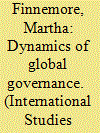

|
|
|
|
|
| Publication |
2014.
|
| Summary/Abstract |
It is hard to quarrel with Weiss and Wilkinson's argument that deeper investigation of global governance could have big payoffs, and the four "primary pursuits" or research tasks they sketch will interest many scholars in this field. My concern is that while Weiss and Wilkinson nicely describe the importance of these tasks, they offer only cursory suggestions about ways forward when they could do much more. Unlike Weiss and Wilkinson (hereafter W&W), I see a great deal of first rate work being done that speaks directly to issues they raise-how power is exercised globally,2 structures of global authority,3 increasing complexity,4 actor proliferation, and change. The problem, I would argue, is not that scholars are ignoring these issues, but that so much more could and should be done. In this short essay, I build on foundations laid by others to sketch more focused research agendas for global governance scholars in four areas to tackle some of the central questions W&W identify, with particular attention to their laudable interest in change.
|
|
|
|
|
|
|
|
|
|
|
|
|
|
|
|
| 19 |
ID:
166783
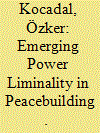

|
|
|
|
|
| Summary/Abstract |
International peacebuilding is no longer dominated by Western actors and their liberal peace framework, neither there is a full-fledged alternative formulated by emerging peacebuilding actors. In this paper, I first establish the relationship between the liminality of emerging powers and their mimicry of the liberal peace. Secondly, I distinguish three forms of mimicry in peacebuilding that stem from emerging power liminality: a discursive mimicry, a complete mimicry and a substantive mimicry. In the case of the discursive mimicry, there is a liberal peacebuilding discourse which is rarely substantiated with policies. The complete mimicry is when both the liberal discourse and the policies are mimicked, and the substantive mimicry is a genuine adaptation of the liberal peacebuilding by the emerging power. The case of Turkish peacebuilding is analysed to illustrate the tripartite distinction. I demonstrate that Turkey mimics solely the discourse of the democratic peace thesis, while there is a complete mimicry of the Western model in security sector reform. However, the Turkish civil society peacebuilding and Turkey’s approach to economic development substantively mimic their liberal peace counterparts. This article contributes to the critical literature on liberal peacebuilding by identifying the different forms of emerging actors’ mimicry of the liberal peace.
|
|
|
|
|
|
|
|
|
|
|
|
|
|
|
|
| 20 |
ID:
107432
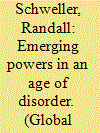

|
|
|
|
|
| Publication |
2011.
|
| Summary/Abstract |
THE DRAMATIC RISE OF CHINA AND INDIA AMONG OTHERS HAS SET THE STAGE
for a fundamental rethinking of world politics in an age of the waning dominance of US power as a force for remaking the world in its own image. While
Pax Americana is not yet teetering on the edge of collapse, the consensus opinion is that the relative decline of the United States is probably irreversible and
its unipolar moment will soon give way to something new. A “return to multipolarity” is one way of describing this shift. It tells us that several great powers will emerge to challenge US primacy. That is all. The more important
question is: What sort of global order will emerge on the other side of the transition from unipolarity to multipolarity? Will it be one of peace and plenty or
conflict and scarcity? On this issue, experts are divided into two camps, pessimists and optimists.
|
|
|
|
|
|
|
|
|
|
|
|
|
|
|
|
|
|
|
|
|